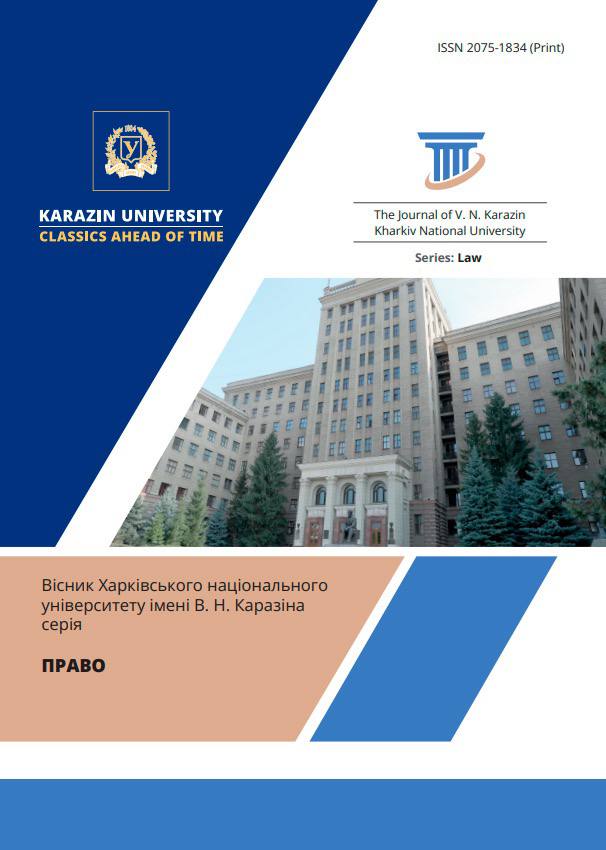RESTRICTIONS ON OWNERSHIP RIGHTS TO CULTURAL HERITAGE MONUMENTS
Abstract
Introduction. As of today, transformations in the socio-cultural sphere continue to occur in Ukraine, and, of course, one of the central places in this turbulent process is the attention of the state to cultural heritage monuments as carriers of the so-called «culture code» of the Ukrainian people. Analysis of doctrinal developments in the field of the legal nature and peculiarities of the circulation of cultural heritage monuments and the corresponding state of legal regulation allows us to state the need to improve the main aspects of the exercise of the right of ownership to such objects. The current state of regulation of the outlined sphere is characterized by mosaicism, certain gaps and uncertainty, and under such circumstances, special attention needs to be paid to studying the issues of exercising the right of ownership to cultural heritage monuments in general and the restrictions of such a right in particular.
The purpose of the study is to analyze and generalize the main restrictions on the right of ownership to cultural heritage monuments.
Summary of the main results. When characterizing the right of ownership of cultural heritage monuments, the key is the interdisciplinary nature of the regulation of property relations in the specified area. It should be noted that an important place in the system of relevant regulatory legal acts is occupied by international regulatory legal acts, which contain provisions on both the protection and preservation of cultural heritage objects, and indirectly establish appropriate restrictions for their use, aimed, again, at the protection and preservation of such objects. At the national level, modern domestic legislation contains a set of relevant norms contained in various branches of law. In particular, sectoral legislation provides for the presence of a special legal regime for the object under study, which cannot be destroyed or transformed without the permission of the relevant authorities or used in a way that threatens its preservation. Cultural heritage monuments may be alienated, as well as transferred by the owner or an authorized body to another legal entity or individual for possession, use or management with the consent of the relevant cultural heritage protection body.
Conclusion. Legislative regulation of restrictions on ownership of cultural heritage monuments should be based on the paradigm of balance of both private interests (interests of the owner) and the interests of society. The above requires the implementation of a comprehensive system that includes improving the provisions of current legislation, introducing effective mechanisms for stimulating owners of cultural heritage monuments and implementing international developments in the field under study into domestic legislative realities. It is also considered expedient to propose a classification of restrictions on ownership of cultural heritage monuments into: 1) established by relevant sources: international regulatory legal acts or provisions of national legislation; 2) established by law depending on the degree of turnover of a cultural heritage monument; 3) universal (general) restrictions, which include the obligation to conclude a protection agreement, and special restrictions that apply in certain individual cases.
Downloads
References
Про охорону культурної спадщини: Закон України від 08.06.2000 р. № 1805–III. Відомості Верховної Ради України. 2000. № 39. Ст. 333.
Європейська конвенція про охорону археологічної спадщини (переглянута) (ETS N 143) від 15.03.2006: Офіційний вісник України. 2006. № 9, стор. 247, стаття 591.
Кодекс України про адміністративні правопорушення: Закон Верховної Ради УРСР від 07.12.1984 р. № 8073–X. Відомості Верховної Ради УРСР. 1984. № 51. Ст. 1122.
Про Перелік пам’яток культурної спадщини, що не підлягають приватизації: Закон України. Відомості Верховної Ради України. 2009 р.. № 8. стор. 242, Ст. 105.
Про охорону археологічної спадщини: Закон України. Відомості Верховної Ради України. 2004. № 26. Ст. 361.
Про музеї та музейну справу: Закон України. Відомості Верховної Ради України. 1995 р. № 25. Стаття 191.
Цивільний кодекс України. Офіційний вісник України. 2003. № 11 (28.03.2003). Ст. 461.
Про вивезення, ввезення та повернення культурних цінностей. Закон України. Відомості Верховної Ради України. 1999 р. № 48. Ст. 405.
Зверховська В.Ф. Культурні цінності як об’єкти цивільних прав: дисс. ... канд. юрид. наук: 12.00.03. Одеса, 2015. 212 c.
Городиський І. М. Суспільний інтерес як підстава для обмеження права власності на культурні пам’ятки. Часопис цивілістики. 2020. Вип. 39. С. 24-29.
Copyright (c) 2024 Олена Устименко

This work is licensed under a Creative Commons Attribution 4.0 International License.




